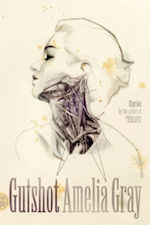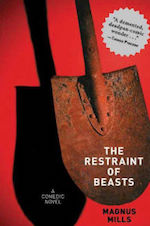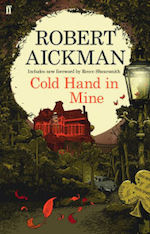We all do this sometimes—it’s a survival tactic and probably largely instinctual: if we move very slowly and pretend nothing is wrong and make no sudden moves maybe we’ll be able to conclude the conversation and get out the door before the insane person we’re talking to really flips out. Some of the stories and novels I love the most do this as well, with the characters either not responding or responding differently than you’d expect. At its best, what that does to you as a reader is make you wonder about your own sanity: if the characters see it as normal, shouldn’t you?
We (by which I guess I mean I, though I hope I’m not alone in this) have all been in relationships where years later we look back and don’t recognize our actions, can’t really understand why we were willing to go along with the other person’s ideas or behavior which, now that time has gone by, we recognize as delusional. Since humans are imitative animals, we often take our cues from the people around us. If you do that long enough with the wrong person, you enter into the sphere of their insanity in a way that makes you regard the insanity as the new normal.
Amelia Gray, “The Lives of Ghosts,” from Gutshot
 A good many of the more than two dozen stories in the deft and dark little book Gutshot do this, but probably the winner for me would be “The Lives of Ghosts” which has to qualify as the oddest haunting story ever written. It’s about a girl whose dead mother comes back in the form of a talking pimple on her face a few days before her friend’s wedding. When she explains to the friend who the pimple is we as readers expect the friend not to believe her. That’s how these novels usually go: supernatural thing happens, person is not believed, is isolated, goes crazy, etc. But she does believe her—does hear the mother’s voice as well—and then reveals that she’s got a ghost growth of her own.
A good many of the more than two dozen stories in the deft and dark little book Gutshot do this, but probably the winner for me would be “The Lives of Ghosts” which has to qualify as the oddest haunting story ever written. It’s about a girl whose dead mother comes back in the form of a talking pimple on her face a few days before her friend’s wedding. When she explains to the friend who the pimple is we as readers expect the friend not to believe her. That’s how these novels usually go: supernatural thing happens, person is not believed, is isolated, goes crazy, etc. But she does believe her—does hear the mother’s voice as well—and then reveals that she’s got a ghost growth of her own.
Emmanuel Carrere, The Mustache
 A simple plot. A man who has always worn a mustache shaves it off, planning to surprise his wife. But when he reveals his shaved face, she isn’t surprised at all. She says, “But you never had a mustache.” At first, he thinks she’s joking, but slowly it becomes clear to him that he’s the only one to remember he had a mustache. Her non-response to what he sees as a dramatic change in his appearance ends up threatening his own sanity…
A simple plot. A man who has always worn a mustache shaves it off, planning to surprise his wife. But when he reveals his shaved face, she isn’t surprised at all. She says, “But you never had a mustache.” At first, he thinks she’s joking, but slowly it becomes clear to him that he’s the only one to remember he had a mustache. Her non-response to what he sees as a dramatic change in his appearance ends up threatening his own sanity…
Joyce Carol Oates, “Family,” from Heat and Other Stories
 This is one of the talented Oates’s strangest stories, and among her very best in my opinion. Very little is explained, and the postapocalyptic world of the story is odd enough that we as readers are always kept a step off balance. Among other strange moments, when the father disappears, the mother introduces them to a new father—not a step-father, but an actual father, she insists. Soon, other family members are calling him father and have forgotten they ever had another father. But we as readers remember, and remained unsettled by their rapid forgetting.
This is one of the talented Oates’s strangest stories, and among her very best in my opinion. Very little is explained, and the postapocalyptic world of the story is odd enough that we as readers are always kept a step off balance. Among other strange moments, when the father disappears, the mother introduces them to a new father—not a step-father, but an actual father, she insists. Soon, other family members are calling him father and have forgotten they ever had another father. But we as readers remember, and remained unsettled by their rapid forgetting.
Magnus Mills, The Restraint of Beasts
 A brilliant comic novel about three hapless comic fencing installers who keep having things go wrong. When someone is accidentally killed, they react to the death in an absurd manner and quickly are back to installing their fences. When another accident happens when their boss is there, the reaction, as in Gray’s story, is completely other than what we expect.
A brilliant comic novel about three hapless comic fencing installers who keep having things go wrong. When someone is accidentally killed, they react to the death in an absurd manner and quickly are back to installing their fences. When another accident happens when their boss is there, the reaction, as in Gray’s story, is completely other than what we expect.
Robert Aickman, “The Hospice,” from Cold Hand in Mine
 I could probably assemble this list using just examples from Aickman, and I think his “strange stories” do this better than almost anyone. There’s a moment in “The Hospice” (one moment among many) in which the main character, Maybury, is preparing to take coffee when he notices that one of the other “guests” is attached by a chain to the floor. Not only does seeing this not cause him to flee immediately; he never mentions the incident directly again.
I could probably assemble this list using just examples from Aickman, and I think his “strange stories” do this better than almost anyone. There’s a moment in “The Hospice” (one moment among many) in which the main character, Maybury, is preparing to take coffee when he notices that one of the other “guests” is attached by a chain to the floor. Not only does seeing this not cause him to flee immediately; he never mentions the incident directly again.
Top image: One Flew Over the Cuckoo’s Nest (1975)
 Brian Evenson is the author, most recently, of The Warren. He has published more than a dozen books, including the novel Immobility and the story collection A Collapse of Horses. He lives in Valencia, California.
Brian Evenson is the author, most recently, of The Warren. He has published more than a dozen books, including the novel Immobility and the story collection A Collapse of Horses. He lives in Valencia, California.









